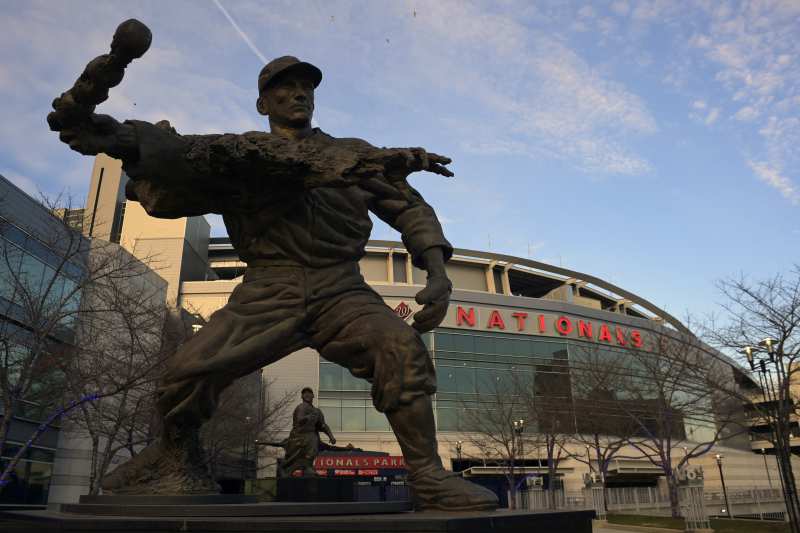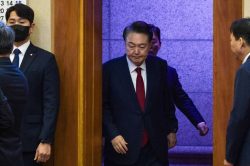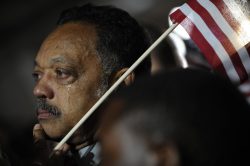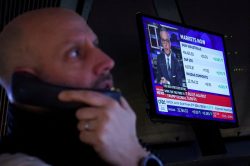MLB, players union reach deal on new CBA, clearing way for spring training and 162-game regular season

Fans will get a full slate of games at Nationals Park this year with the ratification Thursday of a new collective bargaining agreement.
13:38 JST, March 11, 2022
NEW YORK – And just like that, after five years of posturing, 99 agonizing days of an owner-imposed lockout and three months of intermittent negotiations that left many wondering whether anyone really wanted to get a deal done at all, Major League Baseball is back. The owners and players reached a new collective bargaining agreement Thursday afternoon in New York.
The broad concepts of the deal, after all the back and forth, were built on compromise, with neither side getting everything they wanted. The salary threshold at which team spending will incur tax penalties – known as the competitive balance tax – will be higher than ever. The postseason will expand to include 12 teams. MLB revenue will fund a new bonus pool to be distributed among high-achieving young players with less than three years of service time. Minimum salaries will rise, and the amateur draft format will include a lottery for the first pick.
Opening Day is expected for April 7, with spring training camps opening Friday and a mandatory report date of Sunday.
Most importantly, at least to the logistics of the day, the deal will not include the creation of an international amateur draft – at least not yet. Disagreement over that issue halted negotiations briefly Wednesday night when the owners gave the union an ultimatum: Agree to an international draft to replace the current signing free-for-fall or deal with the existing system in which teams that sign top free agents lose draft picks in the process.
“The international draft has been a bargaining objective of the clubs for multiple rounds. We think a draft is the only way to really get at signings, particularly in the Dominican Republic, for years. And we want to get after those problems,” MLB Commissioner Rob Manfred told The Washington Post on Thursday. “This is not a new thing from our perspective. It got highlighted in the negotiation because it was one of those things that got packaged with other issues. When it became clearer that the MLBPA didn’t want to proceed with it, it undid a lot of progress that had been made.”
By Thursday morning the sides had agreed to a rare compromise, setting a July 25 deadline by which the union will agree to the draft and enjoy free agency without draft pick compensation or maintain the international signing system that exists and endure free agency with it.
Once they worked around that roadblock, the owners made the MLB Players Association another proposal and indicated that if it agreed by 3 p.m., they could ratify the deal Thursday night in time to save a full 162-game season that would start a week late, according to a person familiar with the talks.
Thursday’s agreement was less a triumph than a relief, something that stopped self-inflicted wounds from threatening the sport.
“Our union endured the second-longest work stoppage in its history to achieve significant progress in key areas that will improve not just current players’ rights and benefits, but those of generations to come,” Tony Clark, the MLBPA’s executive director, said in a written statement. “Players remained engaged and unified from beginning to end, and in the process re-energized our fraternity.”
Scars probably will linger, particularly when it comes to the perception of the owners as self-interested and that their whims take precedence over the health of the sport for Manfred and his staff. After declaring a lockout when the collective bargaining agreement expired in early December, under the guise of creating “urgency” in the negotiations, MLB did not contact the players union to talk until 43 days later, in mid-January – an inexplicable delay that Manfred said could be explained, in part, by the fact that the union didn’t reach out, either.
But even when talks did begin in mid-January, they weren’t regular negotiating sessions until spring training games already were canceled. Ten straight days of talks at Roger Dean Stadium in Jupiter, Fla., in late February didn’t lead to a deal. And a Tuesday deadline this week stretched into Wednesday, which led Manfred to tentatively cancel another week of games Wednesday night.
Yet when the sides cleared the international draft hurdle midmorning, MLB’s negotiating team told the union that a deal by 3 p.m. could still save the season. The union voted on the MLB’s proposal around that time, and it was no sure thing: The MLBPA’s eight-man executive subcommittee voted unanimously against the proposal, according to a person familiar with the vote. Five of the eight players on that committee, including pitchers Max Scherzer and Gerrit Cole, are clients of Scott Boras, the super agent who has always pushed for more spending on player salaries and made his name on hard-line negotiating tactics. But while the leaders of the union pushed for more, the union merely needed a simple majority to approve the deal, and 26 team player representatives voted in favor. The owners ratified the deal unanimously a few hours later.
“Looking back at it, I think we used deadlines effectively to move the process when it needed to move,” Manfred said. “Who outflanked who? In my view, there’s only one win, and that’s an agreement.”
That agreement fostered a split in the union, creating some gains for the players but not as many as they hoped. The MLBPA entered these CBA negotiations hoping for wholesale changes to a system they believed favored the owners by allowing them to increase revenue without a proportional increase in spending. By negotiating a higher competitive balance tax, the players did loosen up some room for teams to spend more on free agents before having to pay overage charges for doing so.
As for the goals the union outlined at the beginning of the process, results were mixed. The players argued that as an increasing reliance on data led teams to an increasing reliance on cheap, young players, the new CBA needed to ensure those players were compensated in a way commensurate with their production. The new deal includes a raise to minimum salaries, as well as that pre-arbitration bonus pool to funnel more money to the best young players.
The players argued that too many teams were not committed to competing, that many owners were content to sit back and pocket revenue-sharing money without reinvesting in player salaries. The new deal includes a draft lottery to prevent teams from losing their way to a No. 1 pick, a lottery that also includes limits on how many times a team can qualify for it in consecutive years.
And the players were frustrated with service-time manipulation, the process by which teams keep young stars in the minors to delay their free agency. The new agreement includes what many involved in the talks agree is an imperfect solution to that problem, one that rewards teams with draft picks for calling up players who go on to excel.
The owners, meanwhile, got the expanded postseason they were hoping for – though not quite as expansive as they wanted. The final deal includes a 12-team playoff format the players favored instead of the 14-team format the owners coveted for the television revenue it would generate. They also maintained the ability to limit all but 22% of players with two years of service time to reach arbitration – a process that involves a third party determining a player’s salary – and maintained the structure that awards free agency to players after six seasons when the players had originally sought five. The players had targeted these talks as an opportunity to extract major systemic change. Ultimately, their progress was more incremental.
Manfred, who had avoided work stoppages in his previous CBA negotiations as commissioner, said he talked to U.S. Secretary of Labor Marty Walsh about the challenges he and his team faced in these negotiations that it hadn’t before – namely, the prominence of social media.
“Social media has completely changed the interaction between rank-and-file and union leadership. It allows for a lot more active participation. That can have plusses and minuses to it,” he said, echoing concerns expressed by baseball officials privately over the past few weeks about the way players’ minds changed about various facets of proposals once they saw public reaction to them.
But in terms of public reaction, the biggest win for both sides is undoubtedly the fact that they agreed in time to play a full 162-game season, even though some clever scheduling and a few doubleheaders will be necessary to do it. The bargaining was heated and public, at times petty and tone deaf, and resulted in the first work stoppage baseball had experienced in three decades. Manfred said he hoped the concessions MLB made to address player concerns will act as “an olive branch” to help mend the relationship between players and owners in the future – a relationship he admits he has failed to strengthen.
But spring training still will happen, though in an abbreviated form. And the freeze that halted a flurry of transactions in November will lift, setting off a free agent frenzy that could see stars such as Carlos Correa and Freddie Freeman finding new homes in the next few days.
For months, baseball was immersed in a fiery chaos, the kind that plays out in public and leaves no one unscathed, the kind that led Manfred to admit his failings, to call Clark late Thursday and declare a renewed commitment to working together in the years to come. What those years will bring feels far away to everyone involved now. Because for the next few days, baseball will find itself immersed in a joyous chaos, the kind the sport needs to help everyone forget the ugliness of the past few months.
Top Articles in News Services
-

Survey Shows False Election Info Perceived as True
-

Prudential Life Expected to Face Inspection over Fraud
-

Hong Kong Ex-Publisher Jimmy Lai’s Sentence Raises International Outcry as China Defends It
-

Japan’s Nikkei Stock Average Touches 58,000 as Yen, Jgbs Rally on Election Fallout (UPDATE 1)
-

Trump Names Former Federal Reserve Governor Warsh as the Next Fed Chair, Replacing Powell
JN ACCESS RANKING
-

Japan PM Takaichi’s Cabinet Resigns en Masse
-

Japan Institute to Use Domestic Commercial Optical Lattice Clock to Set Japan Standard Time
-

Israeli Ambassador to Japan Speaks about Japan’s Role in the Reconstruction of Gaza
-

Man Infected with Measles Reportedly Dined at Restaurant in Tokyo Station
-

Videos Plagiarized, Reposted with False Subtitles Claiming ‘Ryukyu Belongs to China’; Anti-China False Information Also Posted in Japan

























